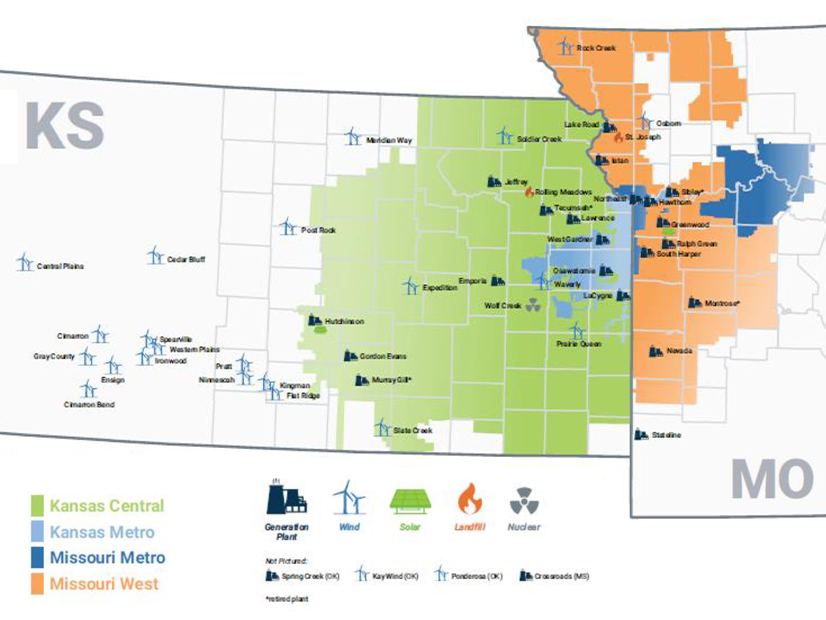
FERC affirmed Evergy’s status Monday as an affiliate of Bluescape Energy Partners, rebuffing rehearing requests from the Kansas City utility and the Edison Electric Institute (ER20-67).
The commission cited the 2020 Allegheny Defense Project v. FERC decision in denying the rehearing requests “by operation of law.” The D.C. Circuit Court of Appeals’ ruling in Allegheny found FERC no longer could grant rehearing requests “for the limited purpose of further consideration.”
Evergy’s operating companies filed a change in status with the commission in 2020, reflecting a change in their upstream ownership when Evergy’s leadership said it would remain a standalone company after pursuing purchase offers. In February 2021, Dallas-based Bluescape said it was investing $155 million in Evergy and, in return, gaining two seats on its Board of Directors.
Last October, FERC issued an order finding Evergy and its subsidiaries are Bluescape affiliates by virtue of the board’s new membership. The commission found that Evergy’s appointment of Bluescape executive chairman C. John Wilder as an independent director to its board to be a “concern” it previously had expressed in a proceeding involving CenterPoint Energy.
FERC also clarified that placing non-independent officers or directors on a utility’s board of directors or its holding company — regardless of whether the ownership stake is 10% or more of the utility or its holding company — qualifies the entity placing those directors as an affiliate of the public utility. (See FERC Clarifies When Board Appointees Make Companies Affiliates.)
Evergy filed its rehearing request in November, alleging FERC’s order contradicted its affiliate definition by not representing an independent basis from which to find affiliation and because its interpretation “confused the function of a rebuttable presumption.” (The commission’s definition of affiliate provides those “owning, controlling or holding with power to vote, less than 10 percent of the outstanding voting securities of a specified company creates a rebuttable presumption of lack of control.”)
“If an entity owns less than 10%, it need make no further showing; unless an opponent adduces some evidence going to control, the issue is settled in favor of no control,” the company argued. “If, however, [the commission] or a protestor adduces sufficient evidence that an entity controls a public utility despite owning less than 10%, the result is to rebut the presumption, i.e., to eliminate the presumption. But that’s not what FERC’s order does. FERC treats rebuttal as resolving the issue in favor of control.”
FERC said it continued to find Wilder’s appointment “overcomes the rebuttable presumption of a lack of control” under its affiliate regulations. It also said the appointment is a per se finding of control “further supported by other aspects of Bluescape’s ownership of Evergy.”
“This indicates … ‘there is liable to be an absence of arm’s-length bargaining in transactions between’ Bluescape and Evergy ‘as to make it necessary or appropriate in the public interest or for the protection of investors or consumers that [Bluescape] be treated as an affiliate’” the commissioners said in the order.
FERC’s acting chair, Willie Phillips, concurred with the order but also said that the commission should have opened a Section 206 proceeding under the Federal Power Act or asked for further briefing.
“Perhaps after briefing we would reach the same result; perhaps not,” he wrote. “Either way, that process would have allowed us to fairly examine what is an issue of first impression before the [c]ommission, helping ensure we reach legally durable results when exercising such an important aspect of our authority.”
Commissioner James Danly dissented, saying the order failed to “fully and adequately” respond to Evergy’s arguments raised in its rehearing request.
“It violates the Administrative Procedure Act,” he said, referring to the process by which federal agencies develop and issue regulations.
EEI’s rehearing request was dismissed after FERC rejected its late intervention motion, saying it failed to demonstrate good cause to intervene out-of-time. The commission ruled EEI was not a party to the proceeding.
Hearing Set for Evergy Asset Recovery
FERC last week accepted SPP‘s filing on behalf of Evergy Kansas Central (Evergy KC) and Evergy Kansas South to establish regulatory assets and recover their unamortized balance through its tariff. The June 30 order was effective July 1, subject to refund, and established hearing and settlement judge procedures (ER23-1762).
The commission said its preliminary analysis found that Evergy’s and SPP’s filings have not been shown to be just and reasonable and may be otherwise unlawful. It said the filings raise issues of material fact more appropriately addressed in the hearing and settlement judge procedures. The hearing will be held in abeyance to provide time for settlement judge procedures.
Evergy KC requested FERC approval to establish three regulatory assets: catalyst costs, generation baghouse costs and critical infrastructure and cybersecurity costs. It also asked for approval to recover the unamortized balances for the assets’ costs incurred in 2019.
Kansas Electric Power Cooperative (KEPCo) filed a formal challenge and complaint in November 2020 against Evergy KC’s annual update to its rate schedule. It argued that the utility had included several regulatory assets’ amortization expenses in the update without commission approval.
FERC in April 2021 granted the complaint and directed Evergy KC to remove from the formula rate inputs any amounts that represented the recovery of the costs. Evergy KC and Evergy Kansas South made a subsequent filing in a separate docket (ER22-1657) that again requested approval to establish the regulatory assets and recover the unamortized balance. FERC accepted the request, suspending it for a nominal period and establishing hearing and settlement judge proceedings.
Evergy KC made another filing to reverse the regulatory asset and immediately record and recover those costs as current operating expenses. FERC rejected that request in October 2022, but Evergy requested a rehearing.
The commission affirmed its finding in February but held that to “the extent … Evergy KC chooses to make an FPA section 205 filing seeking approval to recover the 2019 regulatory-asset related expenses in rates, the [c]ommission will evaluate its filing consistent with [c]ommission precedent.”




